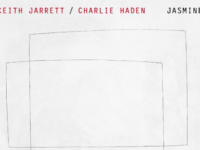Coming from a very prominent jazz and classical pianist who famously disparaged modern, plugged-in instruments at the height of the fusion era, this is quite a revelation.
No End brings into the public realm recordings Keith Jarrett made in his small private studio back in 1986. On it, Jarrett played all the instruments: electric guitars, Fender bass, drums, percussion, table, vocals and, yes, piano. But, very little piano.
In his self-written liner notes he confesses a love for drums and guitar that exceeds his bread-and-butter piano. It also leaves the listener with a most unlikely instruction, considering the source:
“Play this music LOUD, especially tracks 2 to 20, since many inner details will be lost at lower volumes.”
Getting advice like that from the mastermind behind The Köln Concert is akin to getting a viewer discretion warning at the beginning of a Mr. Rogers’ Neighborhood show.
Admittedly, I got no vibe at all from my first listen of No End. There are no fully developed melodies, just a series simple vamps – twenty in all spanning 93 minutes — that quickly get rote. Every tune features Jarrett’s lead guitar, which is competent but ultimately, it’s noodling that can’t hold ones interest for any length of time. A few times I think I noticed where he missed a beat. And the arrangements from song to song don’t vary much, making them sound alike. (For what it’s worth, I have no idea why track 1 didn’t necessarily have to be played “LOUD”).
The second time around I followed Jarrett’s advice and put a closer ear to it, and that’s where I found some virtues, too. He dubbed in all the parts using relatively primitive recording equipment in a cramped studio without the help of someone in the control room while he performed, but somehow he pieced together well-integrated syncopations. No instrument sounds overly dominant or tepid in the mix. Every instrument has a well-defined role.
And though he effuses about the drums and guitar in his notes, it’s Jarrett’s bass playing that sounds the most proficient; it acts almost as a third guitar devising harmonic shapes often more intriguing than the riffs.
So what style of music does Electric Keith Jarrett play? It’s not jazz, that’s for certain. The percussion and drums are often quasi-tribal in Latin and African ways and when he also plays the tabla, Indian influences seep in, too. He discreetly employs background, wordless vocals to construct subtle drones, or even something similar to Indian raga when coupled with the tabla. The melodies, err, riffs can loosely be described as rock, the 60s and 70s kind. There’s a vaguely Santana or Allman Brothers feel to most of these tunes, a similarity that can also be attributed to the very informal way the songs were conceived, like rock was at the turn of the 70s. Essentially, Jarrett was having a jam session with himself.
One view of this record could be that Jarrett forced himself out of his normal comfort zone and handcrafted a record that in some ways is a freer expression than even some of the avant-garde leaning recordings he made with Charlie Haden, Paul Motian and Dewey Redman about fifteen years earlier.
A more cynical view is that No End is just him knocking around in his home studio in his spare time with half-baked ideas performed with instruments he hadn’t mastered well enough to make a living playing and belatedly decided to hawk these demos to his fans by embellishing its significance as valuable insight into the workings of his eccentric but sometimes brilliant musical mind.
The truth probably lies somewhere between these two views. If No End was even a little essential, the tapes wouldn’t have sat in a drawer for twenty-five plus years. But taken for what it is — a series of sketches by a talented musician putting himself in unusual situations that he hadn’t revealed to us before — it’s intriguing enough to fascinate anyone who’s already absorbed a good chunk of his massive discography and are ready for something refreshingly different from him. But not in the forgettable Restoration Ruin sense.
It’s intriguing enough even with all those warts, or perhaps, because of them.
[amazon_enhanced asin=”B00FCAJZTK” /] [amazon_enhanced asin=”B0000262WI” /] [amazon_enhanced asin=”B00BY1F8UQ” /] [amazon_enhanced asin=”B009XMWSRY” /] [amazon_enhanced asin=”B00DP4M6ZK” /]
No End is slated for release November 26, by ECM Records.
- Jeff Oster, Vin Downes + Tom Eaton – ‘Seven Conversations’ (2024) - May 6, 2024
- David Torn – ‘Adityahridayam 321’ (2024) - May 5, 2024
- Ivo Perelman + Matthew Shipp – ‘Magical Incantation’ (2024) - May 4, 2024




